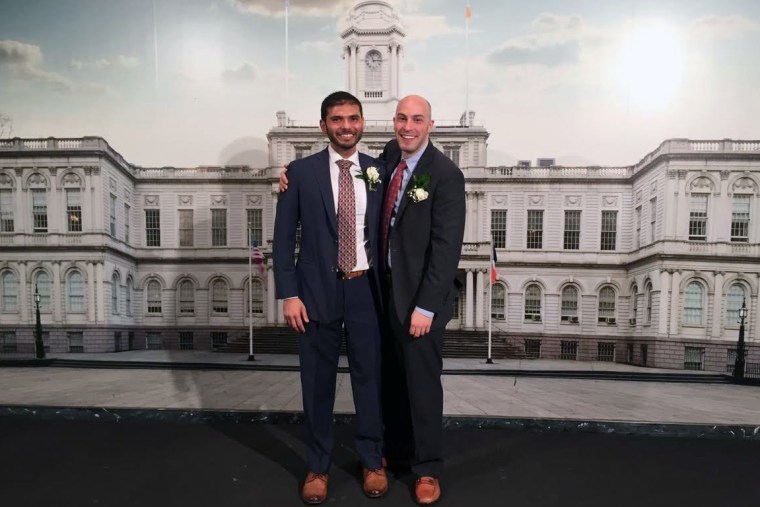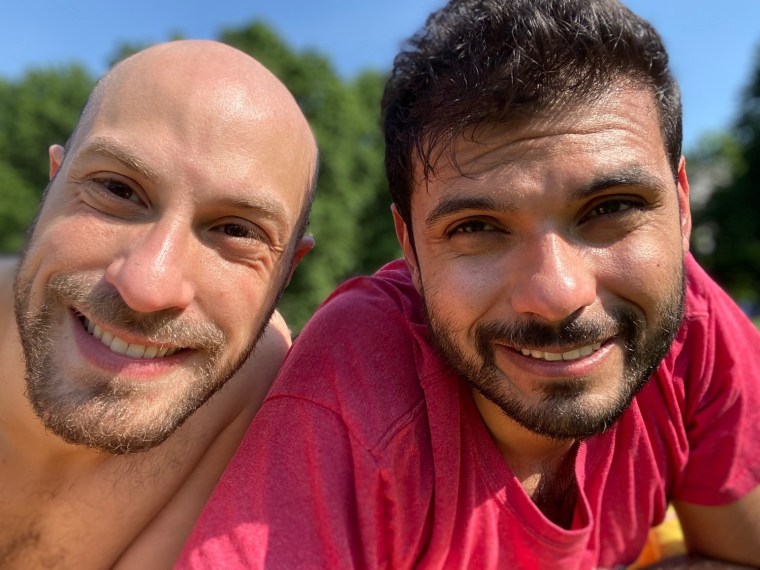Roe reversal may threaten already fragile LGBTQ family-planning landscape
Before the landmark Roe v. Wade abortion rights decision was overturned, the family-building landscape for LGBTQ couples was already fraught with legal and financial obstacles. But now, with the uncertainty following the Roe reversal in June — including how it may affect the legality of certain reproductive procedures — health and legal experts are advising LGBTQ prospective parents to consult with attorneys versed in the specific laws of their states before they begin their family-planning journeys.
Primary care physician Eric Kutscher and his husband, medical student Lala Tanmoy Das, of New York, are starting a family, which they have been thinking about doing for years.
“We talked about having kids literally on our second date,” Das said.
The couple have already gone through in vitro fertilization, or IVF, which entailed using the sperm of one of the men to fertilize a donated egg. The next step on their journey is to find a surrogate to carry the embryo to term. However, the reversal of Roe v. Wade has given them pause.

Many potential surrogates live in states that have restricted abortion access after the high court decision, Das and Kutscher noted, and should there be a complication during the pregnancy, they do not want their surrogate’s options limited.
“Eric and I are extremely pro-choice people,” Das said. “Maternal health comes first, no matter what.”
Kristin Marsoli, the director of marketing for Circle Surrogacy of Boston, said her agency adjusted its screening process and questionnaires last year after Texas changed its laws to ban abortionafter detection of a fetal heartbeat. She said the agency wanted to “ensure that surrogates from Texas were properly educated about what a termination would mean if it came up in their journeys.”
Marsoli said the agency — where nearly half (44% to 46%) of the intended parents identify as LGBTQ — is prepared to make further adjustments as conservative states seek to restrict abortion and reproductive care after the reversal of Roe. Since the decision on June 24, 14 states have already banned or restricted abortion, and seven more are considering similar restrictions.
“Our legal team is keeping a close eye on trigger laws and other changes being made in each state and providing regular updates to our teams so that we can continue to adjust our process as needed,” she said.
For now, the agency is not advising couples like Das and Kutscher to geographically restrict their search for surrogates when the wait for surrogates can easily take up to a year and the legal landscape is still in flux.
“There is still so much that is unknown,” Marsoli said.

Just a few days after the Supreme Court voted to overturn Roe in its Dobbs v. Jackson Women’s Health Organization ruling, Louisiana legislators debated a bill that would have defined life as beginning at fertilization with no exception for assisted reproductive treatments like IVF.
While Louisiana’s personhood bill was scuttled after debate on the House floor, the Dobbs ruling opened the door for states to pass laws that not only dramatically restrict or ban abortion, but also have potential effects on assisted reproductive services.
“Roe was holding up a floor. Legislators couldn’t restrict reproductive health decisions beyond what Roe protected,” said Cathryn Oakley, the state legislative director and senior counsel at the Human Rights Campaign, the country’s largest LGBTQ advocacy group. “States have basically the unfettered ability to regulate those issues as they see fit.”
Depending on the exact wording of state abortion bans, such measures could affect reproductive technologies like IVF, because the process may result in discarding fertilized human embryos.
“If the law says that life begins at the moment of fertilization … that means that those embryos have rights,” Oakley said, even if the fertilization happens outside the body. “It may be impossible for folks in some states to get IVF where they live.”
From 1% to 2% of all U.S. births are the products of IVF every year, according to the Centers for Disease Control and Prevention. And while it is not uncommon for heterosexual couples to use IVF in their family-building journeys, same-sex couples do so disproportionately. A report last year from the U.K.’s Human Fertilisation and Embryology Authority found a fourfold increase in the use of IVF among female same-sex couples: In 2009, 489 IVF cycles (1% of all cycles) involved female partners, compared to 2,435 IVF cycles (4% of all cycles) in 2019.
While many anti-abortion rights groups support IVF, others advocate against access to the procedure. A coalition of anti-abortion rights groups called The Personhood Alliance objects to IVF on the ground that it violates the rights of the embryo.
Missouri, Kansas, Georgia and Alabama already have fetal personhood laws, and legislators in six more states have introduced such measures, according to the Guttmacher Institute, a reproductive rights research group. The Alabama attorney general’s office has said the law will not affect IVF treatment; the consequences of personhood laws in other states remain unclear.
Existing challenges
LGBTQ people are disproportionately affected by any law restricting access to assisted reproductive health care, like IVF.
“The fact is that in the LGBTQ community, a larger percentage of their family-building journeys are going to access assisted reproductive technology,” said Dr. Roger Shedlin, the CEO of Connecticut-based WINFertility. “By definition, you could see that the community is disproportionately impacted.”
And the reversal of Roe comes in the context of an already difficult legal landscape for LGBTQ parents and prospective parents, because states are free to establish their own parentage laws.
“Dobbs doesn’t just drop into a vacuum,” said Polly Crozier, a senior staff attorney at GLBTQ Legal Advocates and Defenders, or GLAD. “Already we have seen attacks on LGBTQ families, because there have been cases in the past few years attacking nonbiological parents. We will probably see more challenges to the marital presumption of parentage and challenges to rights of nonbiological parents.”
Recommended

OUT HEALTH AND WELLNESSAs monkeypox spreads, longtime activists say officials haven’t learned lessons from the AIDS crisis

OUT POLITICS AND POLICYOklahoma schools now require ‘biological sex affidavit’ for student athletes
Many states have not updated parentage laws to accommodate the reality that at least one of the two parents may not be biologically connected to their children, which is the case for many LGBTQ couples with kids.
“Nonbiological parents are already feeling that vulnerability, and then you see all the anti-LGBTQ bills,” Crozier said. (State legislators have already introduced more than 340 anti-LGBTQ bills this year, according to the Human Rights Campaign.)
She added that LGBTQ families should take the legal steps necessary — like second parent adoption or voluntary acknowledgment — to make sure their families are protected.
“This is really the time to make sure those core protections are in place,” Crozier said.
There is even less consistency when it comes to other kinds of laws about assisted reproduction. For example, Louisiana law restricts IVF already. Dr. Nicole Ulrich, a reproductive endocrinologist and specialist in fertility medicine at Audubon Fertility in New Orleans, said her clinic does not store embryos in the state long term. “We store them in Texas right now,” she said.
Ulrich, who estimated that as many as 20% of her patients are LGBTQ, said the clinic is making “contingency plans” about how to make other arrangements for patients in case laws in Texas change, requiring it to relocate the embryos again.
In addition, Louisiana law prohibits the use of a donor egg or donor sperm in a gestational carrier, meaning only couples able to use their own sperm and eggs can access gestational services.
“Because of regulations in Louisiana, we actually can’t help same-sex male couples conceive,” Ulrich said.
“It’s frustrating to essentially be forced to exclude a whole population.”
Financial obstacles can also make treatments like IVF and services like surrogacy prohibitively expensive for many LGBTQ people, and they are often not covered by health insurance.
According to the American Society for Reproductive Medicine, people can expect to spend an average of $12,400 for one cycle of IVF, and surrogacy can cost anywhere from $100,000 to $200,000.
“To add any additional burden or barrier of crossing state lines, staying in a hotel, that’s all going to really add additional burdens for something that is already not accessible for so many people,” Oakley said.
Over the past several years, insurance companies have been improving coverage for assisted reproduction, Shedlin said. However, because of the medical definition of infertility, even some LGBTQ people who have insurance face barriers to accessing those benefits. In many instances, laws designed for heterosexual couples require them to establish histories of infertility before they qualify for coverage.
“Just to access your coverage, you face six months to a year, because we have a medical focus,” Crozier said of qualifying for insurance coverage. “They are essentially treating LGBTQ couples differently than non-LGBTQ couples.”
There is an overall context of heteronormativity, which can produce discrimination and exclusion for LGBTQ people, said Rebecca Kluchin, a professor of history at California State University, Sacramento, focusing on American reproductive history.
“We have this assumption that pregnancy is the purview of straight women,” Kluchin said. “There is an assumption that reproduction is still heterosexual.”
Despite the legal uncertainty and financial obstacles, Kutscher and Das are moving ahead with plans to build their family.
“It means the world to us,” Das said. “We definitely have qualms about what the future will hold — and what the child’s reality will be, what the world will be like … but we’re excited, and we feel ready.”